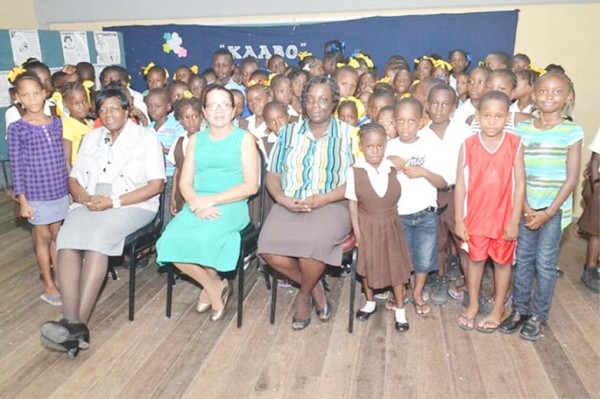A remedial education pilot project targeting pupils of three primary schools in the Buxton/Friendship area was launched on Monday with the aim of improving literacy and numeracy.
Part of First Lady Sandra Granger’s Buxton Youth Initiative, the Buxton/Friendship Remedial Education Project will be done in collaboration with members of the community and is expected to yield better results at the National Grade Six Assessment.
The children expected to benefit are in grades one to five students at the Buxton Primary, Friendship Primary and Company Road Primary schools.
The First Lady explained to Stabroek News that the intention is to observe how this project works and from this design similar programmes throughout the country.
She stressed that it is a community-based project, which she is facilitating.

“I am not here to tell Buxtonians what to do. I am here to see if I can help them achieve what they wish to achieve for themselves,” she said, explaining, “This is the work of Buxtonians and I am here facilitating something that they came up with because they saw the need in the community. I am hoping that something like this seizes the imagination of other citizens and we work out how we can do it. We see how Buxton works, we cost it and we say it will cost you so much to keep a child in school for a term or a year. People who want to volunteer their re-sources can say okay I can keep these many children in school. The whole idea must be community based and community inspired.”
The project will assist both high achievers and those who are underperforming to improve their reading, writing and reasoning skills.
According to Deon Abrams, coordinator of the project, the students will be taught in different tiers. These tiers will be constituted based on their performance during the last academic year, the first tier will be composed of students who scored above 70% while the lowest tier will be composed of those students who have scored lower than 45%.
While several speakers bemoaned the fact that several members of the “younger generation” can neither read nor write, former deputy prime minister Haslyn Parris urged the coordinators not to sideline or ignore the students in their efforts to properly construct and implement the project.
Parris, who is a Buxtonian, cautioned the teachers involved against autocratically deciding what must be taught and learnt, urging that they take the time to discover from the children what they want to learn.
“It cannot be enough to say I’m a big man, I’m a big woman you must listen to me, this is what you must learn,” he said, noting that a Buxtonian child is likely to “cuss you after” for making such a declaration.
Instead, according to Parris, the student must be encouraged to develop “a contemplative habit of mind so that they were prepared to think of what they had learnt and formulate questions about what they will do with what they had learnt.” Reminding those gathered that it takes a village to raise a child, Region Four Chairperson Genevieve Allen welcomed the programme and congratulated the villagers for taking the initiative to address the shortcomings they have identified in the education system. She committed the region to supplying a consignment of books in support of the programme.
Meanwhile NDC Chairman Randolph Blair implored the parents not to take the project for granted because it is free. He charged the parents to work with the coordinators for the betterment of their children
The Buxton/Friendship Remedial Education Project will begin tomorrow and will be held each week on Monday, Tuesday and Wednesday from 3.30 pm to 4.30 pm.
Students will initially be taught at the Friendship Primary School but as the numbers increase, classes will also be held at the Company Road Primary School. Students will be provided with specialized instruction as well as a snack.
The project will be implemented by team of eight teachers from the three schools. Adams explained that while it was initially suggested that retired teachers be used, a decision was taken to utilize persons who are in the education system since they understand current methodology.
The Teachers will be provided with a small stipend. Later incarnations of the project will see a team of health professionals visiting the three schools to screen students for both physical and mental issues which may be impeding their learning as well as the implementation of a daily feeding programme similar to one previously operated in the community by Food for the Poor








